The US Empire's Economic War on Cuba in the 21st Century
Agitating and organizing for the defeat the US Blockade is the best way to help the Cuban people.

In favor? 182 votes. Against? Only two, the usual suspects. Each year, the world comes together at the United Nations General Assembly to near unanimously condemn the cruel and illegal economic blockade that the US Empire has been imposing on Cuba for over 60 years. Designed to stifle Cuba’s ability to trade with the world and access credit, the blockade is aimed at suffocating economic life in Cuba.
In this analysis, international trade data is used to examine the impact of the US blockade on Cuba in the 21st Century. Following the intensification of sanctions under the Trump regime, which have been maintained by the Biden regime, and the arrival of the COVID-19 Pandemic, Cuba faces it’s most severe economic crisis since the the extreme hardships of the Special Period in the early 1990s.
The impact of US sanctions on Cuban economy and society
In early 1960, US diplomat Lester D. Mallory, then Deputy Assistant Secretary of State, fearing the likelihood that Cuba would align with the USSR, proposed a long-term strategy of economic warfare to facilitate the defeat of Cuban Revolution, writing:
The only foreseeable means of alienating internal support is through disenchantment and disaffection based on economic dissatisfaction and hardship. If such a policy is adopted, it should … make the greatest inroads in denying money and supplies to Cuba, to decrease monetary and real wages, to bring about hunger, desperation and overthrow of government.
Unable to defeat the Cuban Revolution with overt military force, the US Empire turned to a full spectrum destabilization campaign of assassination attempts, terrorist attacks, sabotage, bio-warfare and the world’s longest running economic blockade. Over 60 years later and the US Empire’s approach to Cuba, with the sole exception of one very brief and partial thaw during the second Obama term, has only ever changed to grow more severe and inhumane.
The blockade does not just deny Cuba it’s most important natural trade partner, it blocks Cuba’s freedom to do world trade and access credit. Cuba is a small island nation that has suffered under the legacy of hundreds of years of colonialism, which has stunted the development of many local industries. While no nation in the age of globalized capitalism is truly self-sufficient, those like Cuba are especially dependent on the world market to buy many goods that cannot be produced domestically. In order to pay for import goods, a nation must either borrow the money or sell goods on the world market. To attack the international trade of a country like Cuba is therefore to harm the very fabric of economic life.
1990s to 2000
Trade and aid from the Soviet sphere had greatly reduced the impact of the US blockade. When the USSR and the Soviet bloc of nations collapsed in the early 1990s, over 80% of Cuba’s international trade evaporated suddenly. The resulting economic shock reduced Cuba’s GDP by over a third in a few years, producing a time of deep crisis of war-like severity known as the Special Period. With Cuba now isolated in economic terms, the impacts of the US blockade and campaign of general economic warfare were now felt full force.
The US Empire, now ruling over the world entirely uncontested, could leverage it’s global superpower status to apply maximum economic pressure on Cuba. In the mid-1990s, with the Cuban people suffering through dire economic crisis, the US imperialists passed a series of laws, including the 1992 “Cuba Democracy Act” and 1996 Helms-Burton Act, that imposed cruel new sanctions on Cuba. Cutting off an isolated and weakened Cuba’s access to world trade and credit even further, the imperialists hoped, would deal a final blow to the Cuban Revolution.
2000s to 2020s
Despite the overwhelming force of US economic warfare, Cuba recovered from the depths of the Special Period crisis by the turn of the millennium. Pivoting away from the ailing sugar industry and toward tourism, medical service exports, and biotechnology the Cuban economy posted almost two decades of steady economic growth, even in the presence of chronic economic challenges. Cuba’s economic recovery was greatly boosted by the trade of medical services for Venezuelan oil, allowing Cuba to meet its energy needs and providing an important source of foreign exchange in refined petroleum.
A brief window of optimism existed for many Cubans during the tail end of the last Obama regime in 2015 when some aspects of the economic blockade were eased or removed. Such hopes were dashed quickly when the incoming Trump regime reversed course back to a campaign of maximum economic pressure, restoring sanctions lifted under Obama and adding many new highly restrictive measures. Trump’s former national security adviser and noted war criminal John Bolton announced to the world that Cuba, along with Venezuela and Nicaragua as the “Troika of Tyranny," would be subjected to intensified destabilization campaigns.
In total, over 240 new measures were taken by the Trump regime to ramp up the economic war against Cuba. Some highlights include:
- Allowing Title III of the Helms-Burton Act to come into effect, a policy that allows persons and companies that “traffic” in property expropriated after the Cuban Revolution to be sued in US courts. Potentially exposing all foreign companies that do business with Cuba to massive lawsuits, a policy so controvertial that every US president from Clinton to Obama had renewed restrictions on implementing it.
- Greatly reducing the amount of US dollar remittances that Cubans living in the US are allowed to send to Cuba, depriving the nation of an important source of hard currency to purchase imports with.
- Once again adding Cuba to the US Government’s list of State Sponsors of Terrorism on incredible dubious grounds, a move that further complicates the ability of foreign companies to do business with Cuba.
- Strict restrictions on US banks facilitating dollar-denominated transactions involving either Cuban companies or goods (so-called U-turn transactions), impeding Cuba’s ability to make or receive payments for trade.
While on the campaign trail, President Biden promised to continue Obama’s much more reasonable policy of detente and gradual easing toward Cuba. Once in power, unsurprisingly, the Biden regime has so far continued with Trump’s aggressive strategy aimed at overthrowing Cuban socialism with debilitating sanctions.
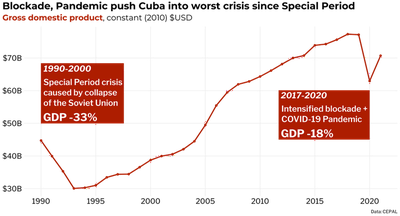
As of Spring 2021, the Cuban government estimated that intensified sanctions initiated by Trump and followed through on by Biden inflicted about $20 billion in economic damage since 2017. Rising financial and credit restrictions due to sanctions are depriving the Cuban economy of much needed hard currency to pay for vital imports, leading to shortages and infrastructural breakdown. Combined with the devastating economic impact of the COVID-19 Pandemic, the renewed US economic war on Cuba has pushed the nation into the most severe economic crisis since the Special Period of the early 1990s. Cuba’s inflation adjusted (2010 constant dollars) GDP fell by 18% from 2017 to 2020, with an 11% contraction in 2020 alone, followed by a projected modest recovery of 3% to 3.5% growth in 2021.
The Trump-Biden trade war on Cuba
The heightened blockade since 2017 is having an enormous impact on Cuba’s ability to participate in world trade. Financial sanctions intended to keep Cuba excluded from the world financial system are causing great difficulty for Cuban firms in arranging international payments and investments. Many major banks, not just those based in the US, are hesitant to deal with Cuban companies at all, fearing potentially harsh penalties for violating US sanctions. They fear for good reason too. To name a few examples of banks that have faced massive lawsuits and fines because of US Cuba sanctions:
- French bank Societe Generale was fined $1.3B in 2018 for violating sanctions on Cuba and Iran.
- British bank Standard Chartered was hit with a $1.1B fine in 2019 for trading with Cuba, Iran and other nations.
- Swiss holdings bank LafargeHolcim is the current target of a $270 million Title III suit in a Florida court.
In January of 2021, one of the Trump regime’s final acts was to sanction BFI, Cuba’s main international bank. Cuban firms are now reporting that contracts, payments and credit are being denied or cancelled by foreign banks and companies more frequently than ever before due to the risks presented by stricter sanctions. Since the intensified economic war on Cuba began under Trump and continues so far under Biden, the value of Cuba’s exports and imports of goods has been reduced by over 80%.
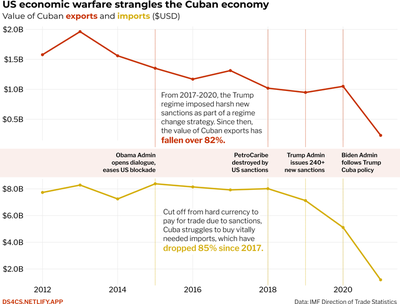
Cuba suffers from an imposed fuel crisis
Since 2015, the US has enforced brutal sanctions on The Bolivarian Republic of Venezuela, an important ally to Cuba and many small nations in the Caribbean. To a significant extent, Cuba’s economic recovery during the 2000s was fueled by the Venezuelan oil that it received in trade for the services of over 20,000 Cuban doctors. Venezuela’s state-owned oil industry has been dealt a great blow by US sanctions. On top of that, companies involved in transporting oil to Cuba have been targeted specifically by new sanctions.
Following the tightening of energy sanctions, Cuban oil imports fell by an astounding 93% from 2017 to 2018, producing a state of severe chronic energy crisis in Cuba. Due to the vastly reduced availability of oil, Cubans now face fuel rationing, regular blackouts, and huge rises in electricity prices. This situation is severely impacting the Cuban economy as a whole, as work in non-essential companies is interrupted due to frequent blackouts.
Cuba’s main sources of foreign exchange are all under attack
Medical service exports
Exports of services have replaced the export of goods as the main source of foreign exchange for Cuba, accounting for up to 70% exports. Cuba has a long history of medical internationalism, sending doctors for free to poor nations all over the world. In recent history, exchange of medical services with partner nation that can afford to pay has become a major source of income for funding the Cuban health care system. In recent years, Cuban medical missions have come under attack by the US empire and it’s regional allies, as Cuban doctors have been forced to leave Brazil, Colombia, Eduacor, and even Bolivia, where medical services were offered as a donation.
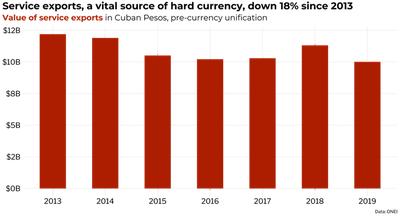
Tourism
Since opening up to international tourism in the 1990s, Cuba has become a prime tourist destination in the world. Tourism is a key source of foreign exchange currency for Cuba to finance imports and development. It’s also an extremely important source of real income to many ordinary Cubans. Cuban tourism was no doubt harmed when the Trump regime re-imposed the long time travel ban on US citizens and restrictions on cruise ship docking.
Since US citizens have long been banned from traveling to Cuba in most circumstances, the Cubans have managed to developed a healthy tourism industry that doesn’t rely on US tourism, with over 4.7 million international visitors in 2018. With the unexpected arrival of the COVID-19 Pandemic, international tourism has been all but wiped out with a 97% drop in the number of visitors by 2021.
Export industries
Many of Cuba’s most important export industries have been struggling under the burden of decades of sanctions. Cuban exporters face a double-edged challenge as production of key goods is hampered by shortages of energy, inputs, and modern machinery, while the sale of goods on the international market is stymied by the blockade. US sanctions have long targeted key sectors to deprive the Cuban economy of foreign exchange. Recently imposed sanctions have targeted exports of both the tobacco and rum industries, nickel production, and Cuba’s budding export industry in cheap generic drugs. Just the six export goods depicted below represent an annual loss in foreign exchange value of $871 million USD compared to 2012; exports of a few goods have risen to compensate, zinc for example, but nowhere near enough to make up for the lost income.
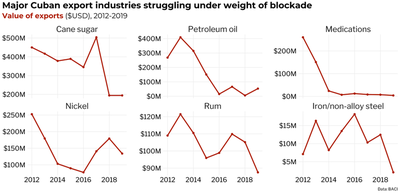
Cuban industries are denied vital imports
The blockade means to hamstring the development of Cuban industry and infrastructure by limiting key inputs only available for import. Cuban importers again face a two-pronged problem, as sanctions block outright access to primary markets of many key goods, while the foreign exchange problem created by sanctions make the costs of imports more onerous. Cuban importers often have access to lower quantities and quality of goods, must pay premium prices in non-standard markets, and often face lengthy delays to shipping and increased shipping costs.
Many industries endure severe chronic shortages of important inputs. The supply of imported Sulfuric acid, for example, needed in both nickel processing and refining petroleum oil, has decreased by almost entirely (99%) since 2012. Likewise, imports of specialized equipment needed by tobacco and rum producing enterprises have been in extremely short supply for over a decade.
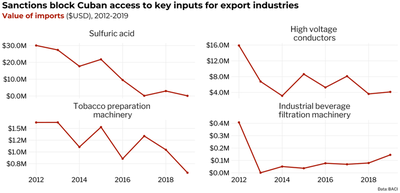
US blockade inflicts hunger on the Cuban people
Feeding the people has always been a main priority of the Cuban Revolution. Despite enduring severe economic challenges, Cubans experienced several decades of improving nutrition, following the initial food crisis of the 1990s. From 2002 to 2019, the average daily caloric and protein intake of Cubans steadily increased. Since the tightening of the blockade and the onset of the pandemic in 2020, Cuba has been going through its most severe food shortages since the Special Period, marked by greatly increasing food prices and lengthy absences of staples like bread and milk.
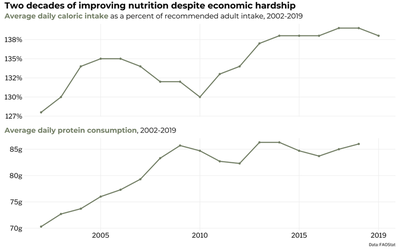
Cuban agriculture confronts significant barriers, as the blockade has long prevented Cuban farmers from accessing key agricultural inputs. Since 2012 the supply of imported fertilizers was down 79%, while 71% less irrigation equipment and tractors were imported. Due to chronic shortages of gasoline, farmers struggle to fill the tanks of tractors and trucks. Even with a renewed turn towards low-input, agroecological farming methods in Cuba, the fuel crisis is preventing produce from being transported from fields to urban markets before rotting.
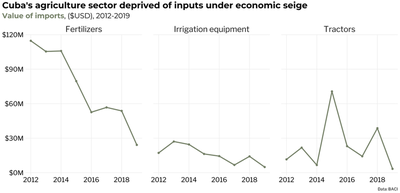
While Cuba produces a significant quantity of fresh fruits and vegetables, almost enough to meet national needs for some crops, its tropical climate isn’t suited to some staple crops that are important to the Cuban diet such as wheat or oil seed crops. Furthermore, given the capital and input intensity of large-scale meat production, most of the meat in the Cuban diet is imported. Imports of key food staples have either stagnated, such as dairy and pulses, or declined, with 26% less cereals/flour and 46% less edible oils and fats imported by 2019.
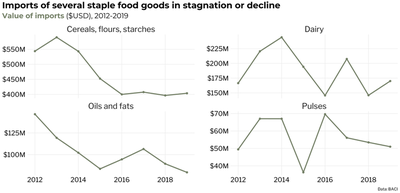
Even though there are technically exemptions for foods, US policy makers are no doubt well aware that cutting off Cuba’s foreign exchange will produce shortages and hunger. The chart below shows the ratio of export income to the cost of food imports, which is an important indicator of the adequacy of a nation’s foreign exchange to pay for food imports. Confronting both declining export revenue and rising import costs for key goods, the share of food imports accounted for about 80% of Cuba’s foreign exchange balance in 2019. The more the availability of hard currency crashes due to sanctions and the pandemic, the greater the difficulty in paying for enough food imports.
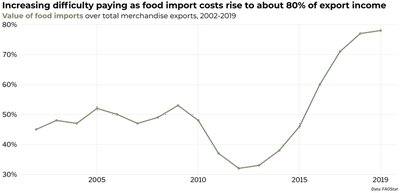
Cuban healthcare suffers under the blockade
Under the immense pressure of US economic warfare, imports of crucial medical products to Cuba were in steep decline going into 2019. Apologists of US imperialism toward Cuba often point to exemptions for medical goods as evidence that they do no harm to the Cuban people. In practice, the medical exemptions are virtually useless, since they are enforced in a de facto manner. Cuba may apply to buy medicine from US companies, yet for example, be unable to find a ship or plane willing to violate the blockade by transporting them to Cuba. Since sanctions are greatly limiting Cuba’s foreign exchange income and access to credit to buy foreign goods with, they might not be able to pay for it in the first place.
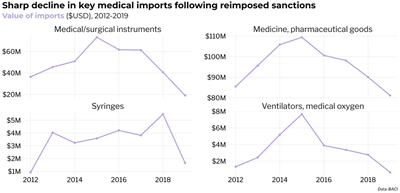
Cuba has built an impressive biotechnology sector in recent decades, even though it’s development has been impeded by the blockade the entire time. Since the early 2000s, Cuba has been cultivating a new industry in the export of cheap generic drugs and highly affordable vaccines to other Global South nations. Sanctions had already hit the sector hard, with exports of vaccines plummeting from a high of $18.6M in 2015 to just $1.3M in 2019.
It’s incredible that Cubans, a small island nation under seige by a mighty empire, have managed to develop several effective home grown COVID-19 vaccines, including one that is not only affordable, but rivals the effectiveness of those produced by the corporate giants with huge support from powerful states. However, shortages of essential products like syringes, due to the blockade are greatly hindering the manufacturing and widespread distribution of the home grown vaccines. Cuba’s vaccines could be crucial for ending the Pandemic in nations across the Global South. Now more than ever, the world needs to stand up to the US Empire and demand the end of the blockade.
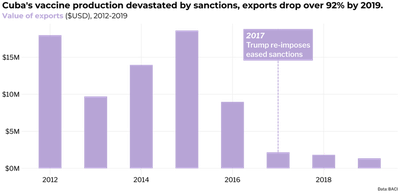
Data sources
- CEPII. Accessed July 2021. BACI: International Trade Database at the Product-Level. Centre d’Études Prospectives et d’Informations Internationales.
- CEPALSTAT. Accessed July 2021. Total Annual GDP at Constant Prices in Dollars. ECLAC, United Nations.
- FAO. Accessed July 2021. Cuba: Selected Indicators. United Nations Food and Agriculture Organization.
- IMF. Accessed July 2021. Direction of Trade Statistics (DOTS). International Monetary Fund.
- ONEI. 2019. “ANUARIO ESTADÍSTICO DE CUBA 2019: CAPÍTULO 8: SECTOR EXTERNO.” Cuba: National Statistics Office.
- Tourism Analytics. Accessed July 2021. Cuba, Total Tourist Arrivals 2021-2017.